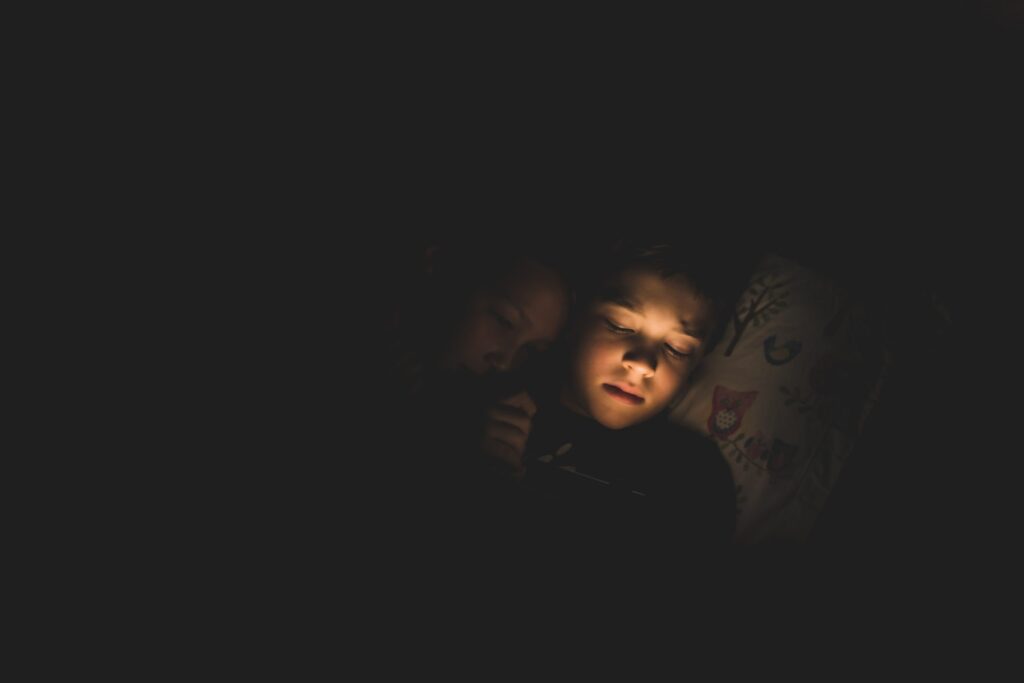It’s no secret that parenting requires patience, humor, and, most importantly, sleep! Sleeping allows your body to hit the reset button and recharge after a day of making lunches, attending soccer games, and completing your personal responsibilities. However, getting a good night’s rest is nearly impossible as a parent when your child is struggling to fall and stay asleep.
Having a restless child can be extremely frustrating and make your days feel long and hectic. You are probably asking yourself, what is the reason my kid just can’t sleep?! In this article, we will dive into the possible factors that could be affecting your child’s ability to hit the pillow.
Having Dinner Too Late
Your weeks are likely busy, so it’s completely understandable if you are someone who pushes dinner to later in the evenings in order to have time to prepare a meal. However, eating too close to bedtime can be a reason why your child is having trouble sleeping. Getting into a routine where you feed, bathe, and get your child into bed all within an hour can feel like a parenting win, but your little one may suffer because of it.
Studies show that eating dinner less than 1 hour before bedtime can put your child at an increased risk for insufficient sleep and compensatory increases. (1) This is why it is crucial for your child to have enough time to digest and let their food settle prior to laying down for bed. In order to make this goal a reality, try meal prepping, ordering pre-made healthy dinners, or making an effort to cook meals earlier in the evening. You might just see the results you’re looking for!
Watching TV Before Bed
Sometimes, the best way to end your night can be laying down on the couch and throwing on your favorite TV show to pass the evening hours. However, this is not the case for your little ones! Watching TV is an easy way to entertain your child until they feel sleepy enough to shut their eyes, but the screen actually stimulates their brains, making it harder to settle in and relax. The light produced by your TV screen and other electronic devices reduces your brain’s ability to create melatonin, which is the chemical your body uses to promote rest and fall asleep.(2)
Not only that – but increased rates of depression and anxiety have also been linked to excess screen time. Due to the easy access to technology, children have less time to give their minds a mental break. Avoiding screen time before bed can also help your child avoid these emotional downfalls. (3)
Instead of playing a movie or cartoon for your child during bedtime, try and pick a few bedtime stories that come in physical copies to read. Not only will this help your child settle in for sleep, but it may also inspire a love for reading and learning that can last well beyond their bedtime routine years! If your child has already begun to show signs of emotional distress due to excess screen time, seeking professional therapeutic help can tackle these feelings before they worsen.
Not Having Enough Time to Wind Down
Again, times can get hectic, and it won’t always be possible to allow your child enough time to wind down before beginning their bedtime routine. Rushing home from sports and putting a quick late-night dinner on the table is sometimes the best you can do! Just be careful not to make this a habit for yourself or your child. Giving them enough time to wind down and relax before bed can make them sleep deeper and without interruption (resulting in a restful night for you, too). Try and promote calming activities to keep your little ones busy before bed. Instead of playing tag or ball, break out a puzzle or set aside some crayons and paper for coloring.
Children are under more stress now than ever before, with the presence of remote school and overall disruption to everyday life, having time to unwind can be hard. Allowing your child to connect with a therapist to discuss their feelings and find solutions in this time of uncertainty can be one of the most valuable gifts you can give to your little one.
Seeking Professional Help
We hope this article helps you discover why your child’s sleep has been affected so that you can make the necessary changes to break this cycle. If you are unable to help your child using these remedies, it might be time to talk to a professional to help you troubleshoot. For more information or to chat with a professional about seeking help for your sleepless child, check out our services!
- https://www.ajmc.com/view/eating-or-drinking-up-to-one-hour-before-bedtime-may-impair-sleep-quality
- https://parentingscience.com/television-affects-sleep/#:~:text=The%20blue%20light%20emitted%20by,for%20you%20to%20fall%20asleep.
- https://www.mchcinc.org/news/whats-happening/health-matters-excessive-screen-time-and-children/

